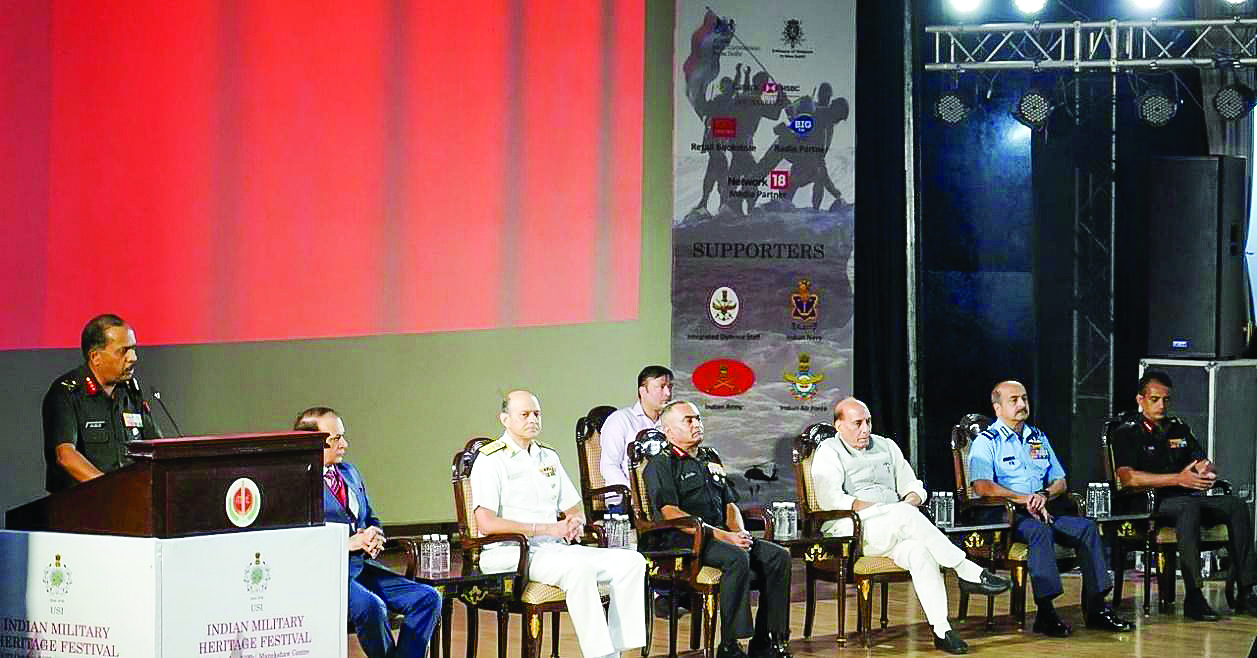NEW DELHI: Project Udbhav which means evolution is a significant collaboration between the Indian Army and the United Service Institution of India (USI), India’s oldest think-tank which was established in 1870 is a study into the evolution of Indian strategic thought, military systems, strategy, operational art with an aim of developing a vocabulary rooted in India’s ancient texts and rich military heritage.
After months of ground work the Project was formally launched during the USI held first Military Heritage Festival on 21 October 2023 by the Defence Minister Rajnath Singh in the presence of General Manoj Pande the Army Chief, Air Marshal V.R. Chaudhari the Chief of the Indian Air Force Vice Admiral S.J. Singh the Vice Chief of Naval Staff, Lieutenant General J.P. Matthews the CISC and Major General B.K. Sharma the Director General of USI in the presence of senior serving Armed Forces personnel, veterans and scholars.
Speaking at the inaugural event Lieutenant General Tarun Kumar Aich, the Deputy Chief of Army Staff (Strategy) highlighted that Project UDBHAV, is an endeavour to revisit the roots of India’s ancient military thoughts. He stated that the essence of the Project lay in synthesising the timeless wisdom of the past with contemporary military practices, thereby crafting a comprehensive approach to address modern security challenges.
He saw it as a visionary initiative aimed at integrating age-old wisdom into the modern military pedagogy. He said the legacy was characterised by a profound reverence for knowledge which was evident in the vast repository of intellectual texts and scholarship across diverse domains. He also mentioned that the groundwork for Project Udbhav had been laid through previous research initiatives by the Indian Army such as compilation of the 75 Stratagems by the Army Training Command and a study on the linkages between Indian culture and strategic thinking by the College of Defence Management.
The Centre for Military History and Conflict Studies at USI visualised, conceptualised and conducted the events with the guidance and support of the Indian Army. These events included workshops, seminars, discussions and research papers, with themes such as “Thematic Commonalities in Hellenic and Indo-Aryan Mythic, Epic and other Narrative Material”; “Evolution of Indian Military Systems, Warfighting & Strategic Thought: Current Research in the Field and Way Forward”. In his opening remarks Maj Gen BK Sharma (Retd) the Director General of USI had highlighted the importance of harnessing traditional thought on warcraft in contemporary operational environments.
The panel discussion on Ancient Indian Traditions on Military Ethics and Culture held at the National Museum saw a packed house. It was moderated by Major General Jagatbir Singh (Retd) who stated that human beings have been fighting each other since prehistoric times, and people have been discussing the rights and wrongs of it for almost as long. The question that needed to be asked concerned the ethics as protagonists describe it as a “just war” but are the means always ethical and are wars more “justified” than “just” and this is in context to our two ongoing conflicts.
As part of Project Udbhav, a seminar-cum-exhibition on “Historical Patterns of Indian Strategic Culture” was held at the National Museum in New Delhi on 21 May 2024. there was also the release of the “Udbhav Compendium” and a book “Alha Udal: Ballad Rendition of Western Uttar Pradesh”. This was followed by the panel discussion on Ancient Indian Traditions on Military Ethics and Culture.
The event was graced by Raksha Rajya Mantri Ajay Bhatt as the chief guest, who, while speaking on the occasion said that the geopolitical landscape is ever-evolving, and it is imperative for the Armed Forces to be adaptive and innovative in their approach. He underlined the importance of recognizing the strength of the nation’s defence which lies not only in its military might but also in the ability to adapt to changing circumstances and leverage the cultural heritage as a source of power.
He described initiatives like Project Udbhav as a guiding light for a future where India is self-reliant, and deeply rooted in its cultural heritage. He also emphasised that the spirit of Aatmanirbhar Bharat is not limited to merely production and consumption of Indian goods, but also to make sincere endeavours to imbibe the essence of Indian thought and values in the current actions and decisions.
Speaking on the occasion, Army Chief General Manoj Pande said Project Udbhav has revealed substantial intellectual convergences between eminent Indian and Western scholars, highlighting the resonance between their thoughts, philosophies and perspectives. He added that the endeavour has catalysed exploration into new areas by unveiling India’s tribal traditions, the Maratha naval legacy, and the individual heroic exploits of military figures, particularly women.
“The Project has delved deep into ancient texts such as Vedas, Puranas, Upanishads and Arthashastra, which are rooted in inter-connectedness, righteousness and ethical values. Furthermore, it has explored the epic battles of the Mahabharata and the strategic brilliance practiced during the reigns of Mauryas, Guptas and Marathas, which has shaped India’s rich military heritage.”
“The project aims to promote indigenous discourse in the Army by integrating India’s ancient strategic acumen into contemporary military domain with a focus on making the force future-ready”.
Gen Pande emphasized that such collective efforts broaden the scope of study of ancient India’s defence and governance, enriching the nation’s strategic outlook. The project has fostered civil-military collaboration among academia, scholars, practitioners, and military experts, strengthening the whole-of-nation approach.

